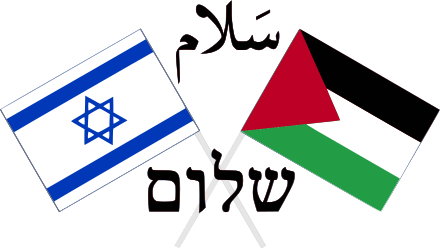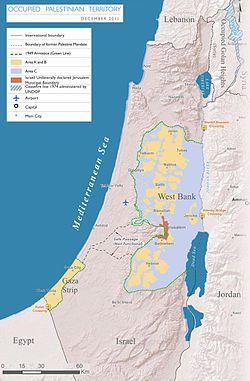
Originating from the United States on NBC Radio in 1952, then on NBC-TV https://www.youtube.com/watch?v=12idnUZgyKQ
The tune the US has been naming, but the Palestinians nor the Israeli government has yet to support is a two-state solution.
The two-state solution to the Israeli–Palestinian conflict envisions an independent State of Palestine alongside the State of Israel, west of the Jordan River. The major points of contention are the boundaries of the two states (though most proposals are based on the 1967 lines), the status of Jerusalem, Israeli settlements, and the right of return of Palestinian refugees.
A peace movement poster: Israeli and Palestinian flags and the words peace in Arabic and Hebrew. Similar images have been used by several groups supporting a two-state solution to the conflict.
Map of the West Bank and the Gaza Strip, 2011. Agreeing on acceptable borders is a major difficulty with the two-state solution.
Area C of the West Bank, controlled by Israel, in blue and red, December 2011
In 1947, the United Nations General Assembly adopted the United Nations Partition Plan for Palestine, which was not implemented. The Palestinian leadership has embraced the concept since the 1982 Arab Summit in Fez, and in 2017 Hamas accepted the idea of a Palestinian state within the 1967 borders, but without recognizing the statehood of Israel. Israel views moves by Palestinian leaders to obtain international recognition of a State of Palestine as being unilateral action by the Palestinians and inconsistent with a negotiated two-state solution. It was reported in 2009 that although polls had consistently shown Israeli and Palestinian majorities in favor of a negotiated two-state settlement, there was "growing disillusionment" with a two-state solution.
There have been many diplomatic efforts to realize a two-state solution,[dubious – discuss] starting from the 1991 Madrid Conference. There followed the 1993 Oslo Accords and the failed 2000 Camp David Summit followed by the Taba negotiations in early 2001. In 2002, the Arab League proposed the Arab Peace Initiative. The latest initiative, which also failed, was the 2013–14 peace talks. A 2021 survey of experts found that 52 percent believed that the two-state solution was no longer achievable. 77 percent believed that if not achieved, the result would be a "one-state reality akin to apartheid".
Following the 2023 Hamas-led attack on Israel and the subsequent Israel–Hamas war, there has been a rekindling of interest in the two-state solution among governments, commentators, and Jewish Diaspora communities, though Israel's Prime Minister Benjamin Netanyahu has emphatically rejected such proposals.
Images: Wikipedia

